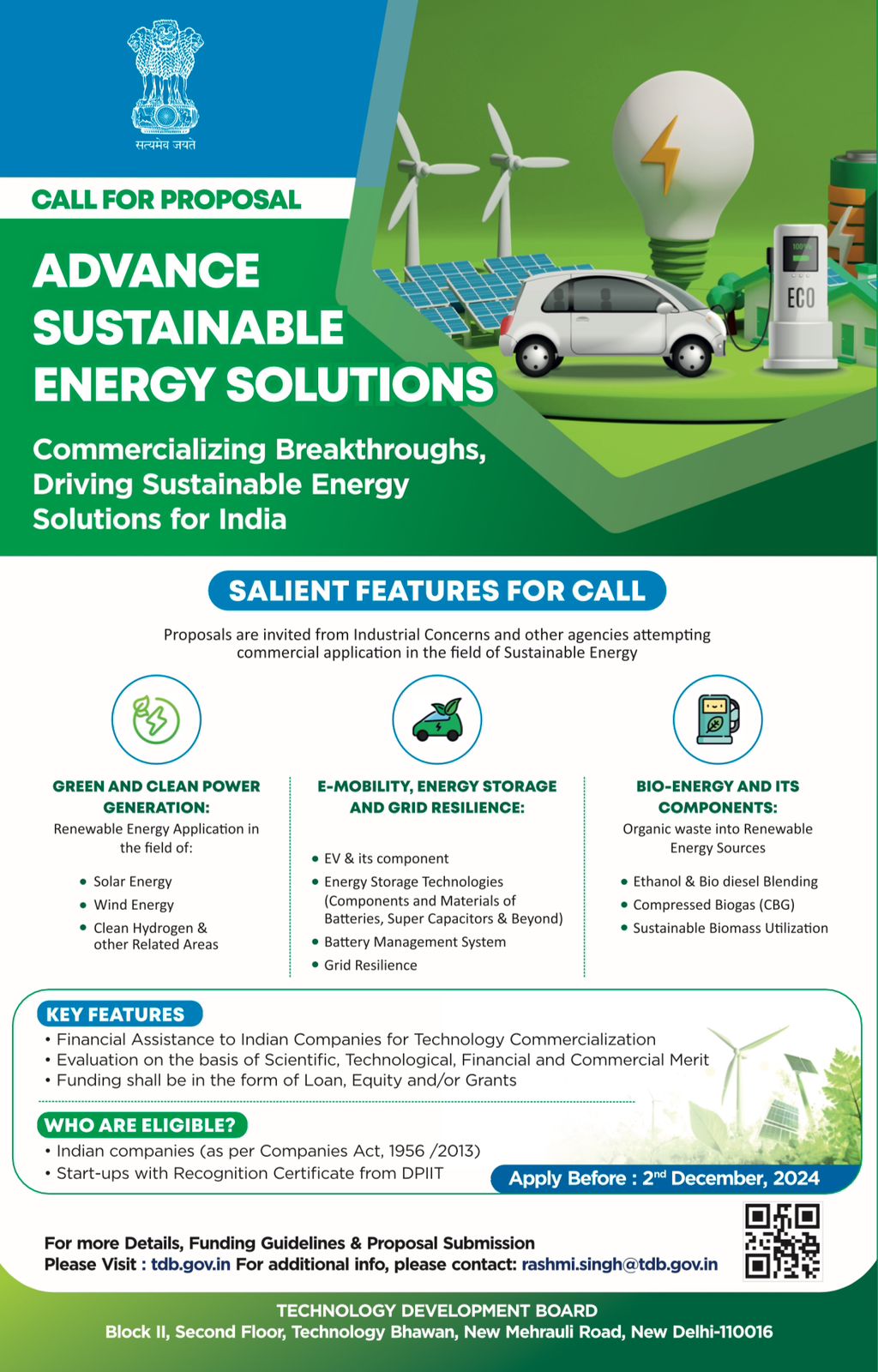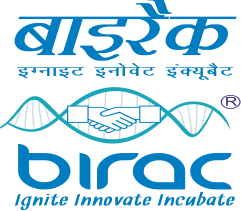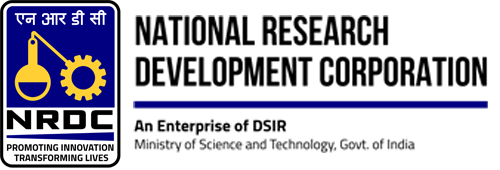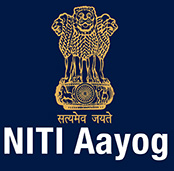Proposal for Advance Sustainable Energy from Indian Private Limited Companies
Technology Development Board, New Delhi (TDB) provides financial assistance to Indian industrial concerns and other agencies, attempting development and commercial application of indigenous technology, or adapting imported technology to wider domestic applications.TDB aims to strengthen the weak zone of technology development and commercialisation in the selected sector by supporting technology development in the industry with short, medium and long-term risk horizons.
India has made significant investments to improve energy access, modernise grid infrastructure, and rural electrification. While the expansion of energy, India is also facing a dual challenge: meeting the growing energy demand while mitigating climate change. In response to these challenges, India is focusing on the implementation of advanced cutting-edge sustainable energy solutions such as green and clean power generation, advanced energy storage systems, and effective utilization of Bio-Energy. Through these innovative measures, India aims to effectively meet its energy demands while also prioritizing environmental sustainability.India is embarking on an ambitious journey to expand its Renewable Energy (RE) capacity, aiming for 500 GW by 2030 and potentially 1 TW by 2035 (Report from Ministry of Power). Solar energy led the charge with an installed capacity of 85.47 GW. Wind energy followed closely, contributing 39.19% to India’s renewable energy generation, with an installed capacity of 46.65 GW as of 30.06.2024 (Minister of State for New & Renewable Energy, Report). In clean hydrogen, India has set a target to achieve a production capacity of 5 million metric tonnes (MMT) by 2030 (National Green Hydrogen Mission). More attention has been paid to energy storage and green hydrogen due to the country’s techno-commercial maturity and demand requirements.
India plans to build 47 gigawatts (GW)/236 GW hours (GWh) of battery storage capacity by 2031-32 (ISGF-Report-on-Energy-Storage-System-(ESS). This ambitious scale-up is equivalent to installing nearly 80 of the largest battery storage facilities globally and is 110 times larger than the capacity of India’s current battery energy storage systems.
Bioenergy is increasingly becoming a crucial alternative to fossil fuels, offering both environmental benefits and economic opportunities, particularly in rural areas.
The government’s strategy encompasses several vital areas, including ethanol and biodiesel blending, Compressed Biogas (CBG), Sustainable Aviation Fuels, biomass utilization (such as pellets and briquettes), Biohydrogen, and waste-to-energy solutions. The ethanol blending percentage has surged from 1.53% in 2014 to 15% in 2024 and hence the government has set an ambitious target of reaching 20% blending by 2025 (Ministry of Petroleum & Natural Gas). The vital role of biofuels in reducing fossil fuel dependence and emissions, paving the way for a cleaner and more sustainable future
India has set bold ambitions and demonstrated remarkable progress on energy transition investment. It surpassed its 2030 goal of achieving 40% of installed capacity from renewable energy sources nine years in advance. To replicate this success and complement it with “made in India” goals, the central and state governments in India have implemented numerous policies and regulations.

Objective:
This proposal is envisaged to;
- India's competitiveness will rely on developing green industrial ecosystems. To support this, introducing the above program will drive advanced energy solutions industries by facilitating capital support and technological collaborations
- Encourage the commercial application of indigenously developed technology in the field of advanced sustainable energy solutions and support them to commission their technology for wider application.
- for adapting imported technology to wider domestic application in the field of advanced sustainable energy.
Salient Features of the Proposal:
The participating industries shall submit a proposal aligned with the following major sectors for advancing sustainable energy solutions;
A. Green and Clean Power Generation:
Commercial application of indigenous technology, or adapting imported technology in the field of Solar Energy, Wind Energy, and Clear Hydrogen and its components respectively
B. E-mobility, Energy Storage and Grid Resilience:
Breakthroughs in energy storage technologies (such as components and materials of batteries, supercapacitors, and beyond), Battery Management Systems. Grid resilience describes the ability to bounce back after network disruptions. The commercially viable microgrids and community-based resilience models.
C. Bio-Energy and its components: Transforming organic waste into renewable energy sources including ethanol and biodiesel blending, Compressed Biogas (CBG), Sustainable Aviation Fuels, biomass utilization (such as pellets and briquettes), Biohydrogen, and waste-toenergy solutions.
Eligibility Criteria:
- Any Company incorporated under the Companies Act, 1956/the Companies Act, 2013.
- A company intending to commercialize the technology.
- Please refer to the website for more details: https://tdb.gov.in/project-fundingguidelinesfaqs.
Modes of Funding:
- Loan @ 5% Simple Annual Interest
- Equity
- Grant
How to Apply:
The detailed information and the format for submission of the proposal may be downloaded from the official website: https://tdb.gov.in/.
Proposal:
Aligning with the national requirement and focus in the advanced energy solutions sector, the Technology Development Board (TDB) issued a ‘Call for Proposal’ inviting applications from Indian companies having innovative/indigenous technologies at the commercialization stage in this emerging sector.
The call shall include companies with innovative/indigenous technologies in the domain like (1) Green and Clean Power Generation, (2) emobility, Energy Storage and Grid Resilience and (3) Bio-Energy and its components. The eligibility criteria and financial support shall be as per the TDB guidelines.
For queries and further details contact:
Ms. Rashmi Singh
Project Coordinator
Technology Development Board
Website: https:/tdb.gov.in/
Email: rashmi.singh@tdb.gov.in
Contact: 011-26511184, (Exten-22042)
Last date - Extended upto 12th December 2024 till 05:00 PM







